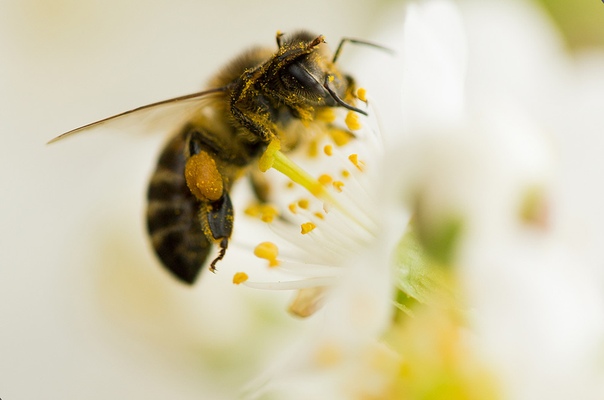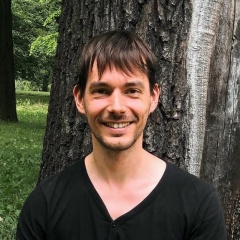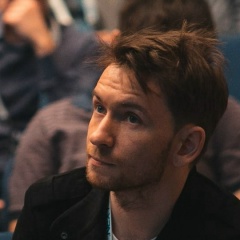Отрывок из романа "Война и мир":
"Как солнце и каждый атом эфира есть шар, законченный в самом себе и вместе с тем только атом недоступного человеку по огромности целого, - так и каждая личность носит в самой себе свои цели и между тем носит их для того, чтобы служить недоступным человеку целям общим.
Пчела, сидевшая на цветке, ужалила ребенка. И ребенок боится пчел и
говорит, что цель пчелы состоит в том, чтобы жалить людей.
Поэт любуется пчелой, впивающейся в чашечку цветка, и говорит, цель пчелы состоит во впивании в себя аромата цветов.
Пчеловод, замечая, что пчела собирает цветочную пыль к приносит ее в улей, говорит, что цель пчелы состоит в собирании меда.
Другой пчеловод, ближе изучив жизнь роя, говорит, что пчела собирает пыль для выкармливанья молодых пчел и выведения матки, что цель ее состоит в продолжении рода.
Ботаник замечает, что, перелетая с пылью двудомного цветка на пестик, пчела оплодотворяет его, и ботаник в этом видит цель пчелы.
Другой, наблюдая переселение растений, видит, что пчела содействует этому переселению, и этот новый наблюдатель может сказать, что в этом состоит цель пчелы.
Но конечная цель пчелы не исчерпывается ни тою, ни другой, ни третьей целью, которые в состоянии открыть ум человеческий. Чем выше поднимается ум человеческий в открытии этих целей, тем очевиднее для него недоступность конечной цели.
Человеку доступно только наблюдение над соответственностью жизни пчелы с другими явлениями жизни. То же с целями исторических лиц и народов".
"Как солнце и каждый атом эфира есть шар, законченный в самом себе и вместе с тем только атом недоступного человеку по огромности целого, - так и каждая личность носит в самой себе свои цели и между тем носит их для того, чтобы служить недоступным человеку целям общим.
Пчела, сидевшая на цветке, ужалила ребенка. И ребенок боится пчел и
говорит, что цель пчелы состоит в том, чтобы жалить людей.
Поэт любуется пчелой, впивающейся в чашечку цветка, и говорит, цель пчелы состоит во впивании в себя аромата цветов.
Пчеловод, замечая, что пчела собирает цветочную пыль к приносит ее в улей, говорит, что цель пчелы состоит в собирании меда.
Другой пчеловод, ближе изучив жизнь роя, говорит, что пчела собирает пыль для выкармливанья молодых пчел и выведения матки, что цель ее состоит в продолжении рода.
Ботаник замечает, что, перелетая с пылью двудомного цветка на пестик, пчела оплодотворяет его, и ботаник в этом видит цель пчелы.
Другой, наблюдая переселение растений, видит, что пчела содействует этому переселению, и этот новый наблюдатель может сказать, что в этом состоит цель пчелы.
Но конечная цель пчелы не исчерпывается ни тою, ни другой, ни третьей целью, которые в состоянии открыть ум человеческий. Чем выше поднимается ум человеческий в открытии этих целей, тем очевиднее для него недоступность конечной цели.
Человеку доступно только наблюдение над соответственностью жизни пчелы с другими явлениями жизни. То же с целями исторических лиц и народов".
Excerpt from the novel "War and Peace":
"Just as the sun and each ether atom is a sphere completed in itself and at the same time only an atom inaccessible to man by the enormity of the whole, so each person carries his own goals in himself and, meanwhile, wears them in order to serve the goals inaccessible to man common.
A bee sitting on a flower stung a baby. And the baby is afraid of bees and
says the goal of the bee is to sting people.
The poet admires the bee digging into a cup of flower, and says the purpose of the bee is to absorb the aroma of flowers.
The beekeeper, noting that the bee collects flower dust and brings it to the hive, says that the purpose of the bee is to collect honey.
Another beekeeper, having studied the life of the swarm closer, says that the bee collects dust for feeding young bees and breeding the uterus, that its purpose is to continue the genus.
The nerd observes that, flying with the dust of a dioecious flower on the pestle, the bee impregnates it, and the nerd sees the purpose of the bee in this.
Another, observing the migration of plants, sees that the bee contributes to this migration, and this new observer may say that this is the purpose of the bee.
But the ultimate goal of the bee is not limited to either that, or the other, or the third goal, which are able to open the human mind. The higher the human mind rises in the discovery of these goals, the more obvious to him the inaccessibility of the ultimate goal.
Only observation of the correspondence of the life of a bee with other phenomena of life is accessible to man. The same with the goals of historical persons and peoples. "
"Just as the sun and each ether atom is a sphere completed in itself and at the same time only an atom inaccessible to man by the enormity of the whole, so each person carries his own goals in himself and, meanwhile, wears them in order to serve the goals inaccessible to man common.
A bee sitting on a flower stung a baby. And the baby is afraid of bees and
says the goal of the bee is to sting people.
The poet admires the bee digging into a cup of flower, and says the purpose of the bee is to absorb the aroma of flowers.
The beekeeper, noting that the bee collects flower dust and brings it to the hive, says that the purpose of the bee is to collect honey.
Another beekeeper, having studied the life of the swarm closer, says that the bee collects dust for feeding young bees and breeding the uterus, that its purpose is to continue the genus.
The nerd observes that, flying with the dust of a dioecious flower on the pestle, the bee impregnates it, and the nerd sees the purpose of the bee in this.
Another, observing the migration of plants, sees that the bee contributes to this migration, and this new observer may say that this is the purpose of the bee.
But the ultimate goal of the bee is not limited to either that, or the other, or the third goal, which are able to open the human mind. The higher the human mind rises in the discovery of these goals, the more obvious to him the inaccessibility of the ultimate goal.
Only observation of the correspondence of the life of a bee with other phenomena of life is accessible to man. The same with the goals of historical persons and peoples. "



У записи 6 лайков,
1 репостов,
475 просмотров.
1 репостов,
475 просмотров.
Эту запись оставил(а) на своей стене Мария Габова



























